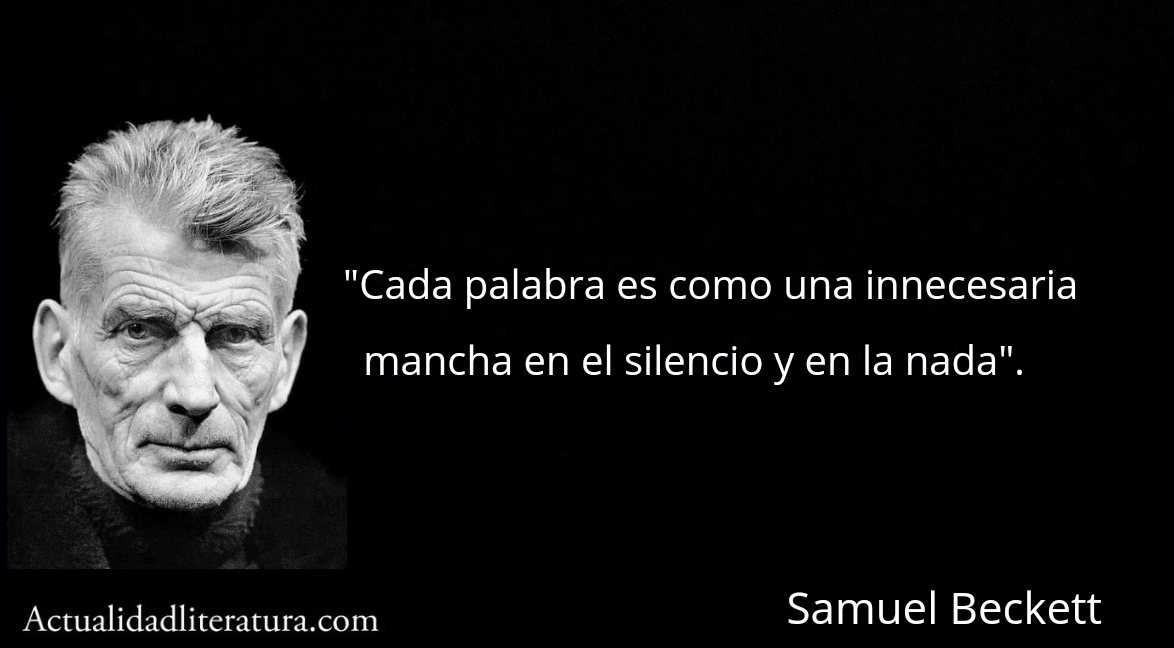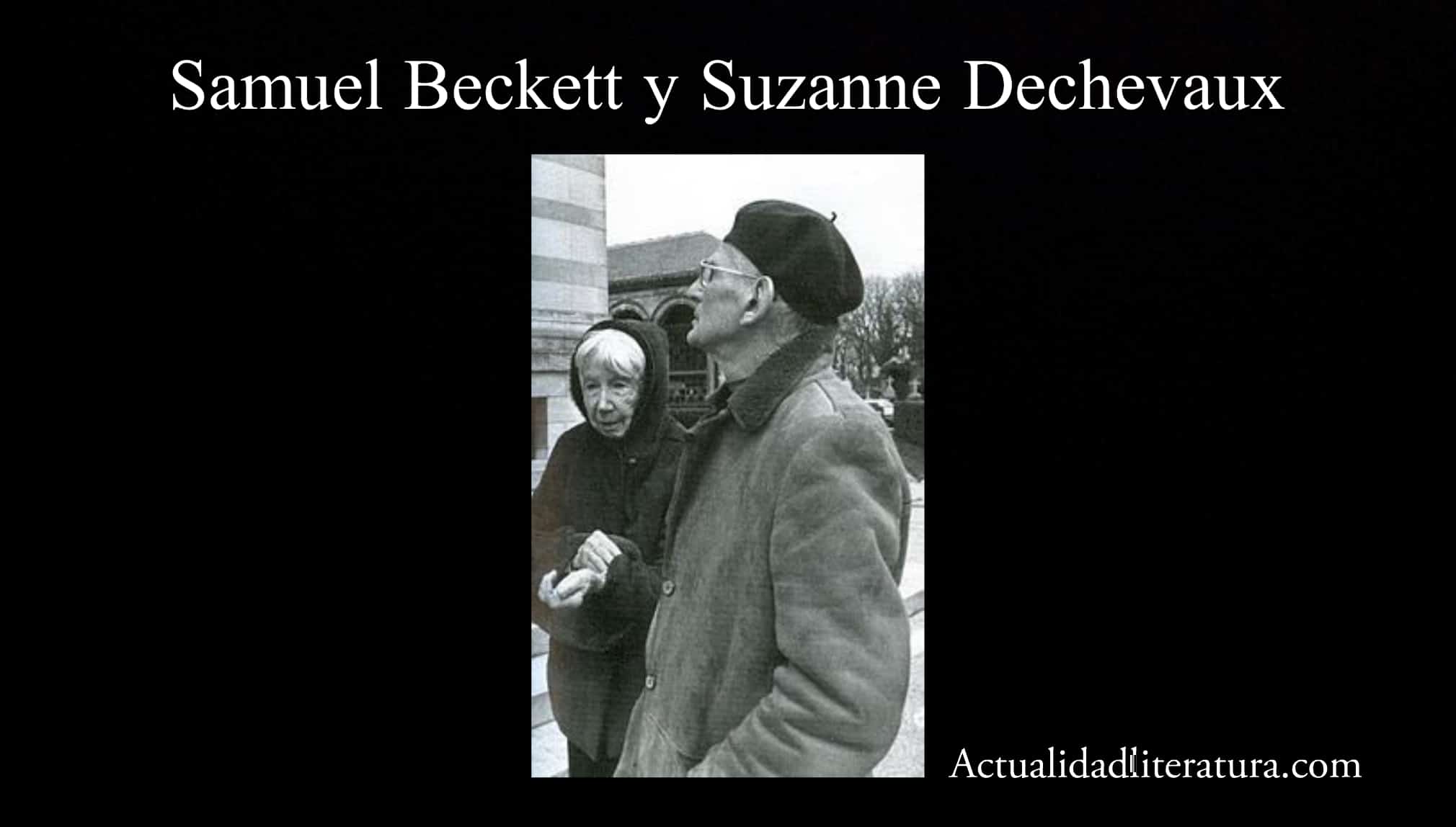
Irish Landscape.
Samuel Barclay Beckett (1906-1989) was a renowned Irish writer. He excelled in various literary genres, such as poetry, novels and dramaturgy. In his performance in this last branch, his work Waiting for Godot it had a resounding success, and today it is a benchmark within the theater of the absurd. The remarkable effort in his long career - distinguished by the originality and depth of his texts - earned him the Nobel Prize for Literature in 1969.
Becket was characterized by portraying in a crude, dark and concise way the reality of man, emphasizing the unreason of their existence. Hence, many critics framed it within nihilism. Although his texts were short, the author managed to give enormous depth through the use of various literary resources, where the images stood out above all else. Perhaps his most significant contribution to literature was breaking with many of the precepts established until his arrival.
Biographical details of the author, Samuel Beckett
Samuel Barclay Beckett was born on Friday April 13, 1906 in the Dublin suburb of Foxrock, Ireland. He was the second child of the marriage between William Beckett and May Roe - a surveyor and a nurse, respectively. Of his mother, the author always remembered the dedication to his profession and his marked religious devotion.
Childhood and studies
From his childhood, Beckett treasured few pleasant experiences. And it is that, contrary to his brother Frank, the writer was very thin and used to get sick continuously. Regarding that time, he once said: "I had little talent for happiness."
While attending initial education he had a brief approach with musical training. His primary instruction took place at Earlsford House School until he was 13 years old; subsequently was enrolled in the Portora Royal School. On this site he met Frank, his older brother. Until today, this last school enjoys a lot of prestige, since the famous Oscar Wilde also saw classes in its classrooms.
Beckett, the polymath
The next stage in Beckett's formation was at Trinity College, Dublin. There, his many facets emerged, his passion for languages was one of them. Regarding this hobby, it is necessary to emphasize that the author was trained in English, French and Italian. He did it specifically between 1923 and 1927, and later he graduated in Modern Philology.
Two of his language tutors were AA Luce and Thomas B. Rudmose-Brown; The latter was the one who opened the doors of French literature to him and also introduced him to the work of Dante Alighieri. Both teachers expressed their amazement at Beckett's excellence in class, both theoretically and practically.
In this campus of studies his sporting gifts were also strongly noticed, since Beckett excelled at chess, rugby, tennis, and - very, very above - cricket. His performance in the sport of bat and ball was such that his name appears on the Wisden Cricketers' Almanack.
In addition to the aforementioned, the writer was also not alien to the arts and culture in general. Regarding this, in the works of James Knowlson - one of the author's best known biographers - Samuel's polymathy is strongly exposed. And it is that Beckett's multidisciplinarity was notorious, especially for the superb way in which he handled himself in each trade he exercised.
Beckett, the theater and its close connection with James Joyce
At Trinity College, Dublin, something happened that was decisive in Beckett's life: his encounter with the theatrical works of Luigi Pirandello. This author It was a key piece in Samuel's later development as a playwright.
Later, Beckett made his first contact with James Joyce. It happened during one of the many bohemian gatherings in the city, thanks to the intercession of Thomas MacGreevy —Samuel's friend — who introduced them. The chemistry between them was immediate, and that was normal, since they were both lovers of Dante's work and passionate philologists.
The encounter with Joyce was key to Beckett's work and life. The author became an assistant to the award-winning writer, and a person close to his family. As a result of the nexus, Samuel even had a certain type of relationship with Lucia Joyce - Jame's daughter.Yes - but it didn't end very well - in fact, she ended up suffering from schizophrenia.
Instantly, as a result of that "lack of love", there was a estrangement between both authors; however, after a year they made the passes. Of this friendship, the mutual appreciation and flattery that Joyce came to do was notorious. regarding Beckett's intellectual performance.
Becket and writing
Dante…Bruno. Vico…Joyce it was the first formally published text by Beckett. It came to light in 1929 and it was a critical essay by the author that would become part of the lines of the book Our Examination Round His Factification for Incamination of Work in Progress —A text about the study of the work of James Joyce. Other prominent authors also wrote that title, including Thomas MacGreevy and William Carlos Williams.
In the middle of that same year, it came to light Beckett's first short story: Assumption. Magazine transition was the platform that hosted the text. This avant-garde literary space was decisive in the development and consolidation of the Irishman's work.
In 1930 he published the poem whoroscope, this little text earned him a local accolade. The following year he returned to Trinity College, but now as a professor. The teaching experience was short-lived, as he gave up the year and dedicated himself to touring Europe. As a result of that break, he wrote the poem Gnome, which was formally published three years later in the dublin magazine. The following year the first novel was published, I dream of women that neither fu nor fa (1932)
His dad's death
In 1933 an event occurred that shook Beckett's existence: the death of his father. The author did not know how to handle the incident well and had to see a psychologist - Dr. Wilfred Bion.. Some essays written by the author are also known from that period. Among these, there is one in particular that stands out: Humanistic Quietism (1934), in whose lines he made a critical analysis of a collection of poems by Thomas MacGreevy.
The "Sinclair v. Gogarty" trial and Beckett's self-exile
This event meant a huge change in the author's life, as it led him to a kind of self-exile. It was a controversy between Henry Sinclair - Samuel's uncle - and Oliver St. John Gogarty. The first defamed the second, accusing him of a usurer, and Beckett was a witness at the trial… a gross mistake.
Gogarty's lawyer used a very strong strategy against the writer to discredit him and destroy his allegation. Among the detriments that were exposed, Beckett's atheism and his sexual debauchery stand out. This action had a huge impact on the author's social and personal life, hence he decided to go to Paris., almost definitively.
Paris: wild romances, contact with death and an encounter with love

Torre Eiffel
Something that characterized Beckett when he stepped into his thirties, in addition to his enormous literary output, was his promiscuity. For him, Paris was the perfect place to unleash his charm with women. One of the best known anecdotes in this regard arose between the end of 1937 and the beginning of 1938, in the middle of the festivities before and after the end of the year.
From that period it is known that Beckett had simultaneous love affairs with three women. One of them stands out in particular, because, in addition to being a lover, she was a patron of the author: Peggy Guggenheim.
Another quasi-tragic event that occurred when I was a newcomer in Paris he was a stabbing victim (1938). The wound was deep and lightly touched the heart of Beckett, who was miraculously saved. The attacker was a man named Prudent, a local pimp who later in court - and faced by the writer - claimed that he did not know what happened to him at that moment, and that he was very sorry.
Beckett was saved thanks to the prompt action of James Joyce. The award-winning writer moved his influences and promptly secured a room for his friend in a private hospital. There, Samuel gradually recovered.
Suzanne dechevaux-dumesnil —Recognized musician and athlete— knew what happenedWell, in a short time, the incident became known in almost all of Paris. She made an approximation to Beckett that would be definitive, then they never parted again.
Two years later, in 1940, Beckett met for the last time -not knowing- with the man who saved her life, her dear friend and mentor James Joyce. The award-winning Irish writer passed away shortly after, in early 1941.
Beckett and World War II
Beckett was no stranger to this war conflict. As soon as the Germans occupied France in 1940, the writer joined the Resistance. His role was basic: to carry the courier; However, despite being a simple job, it was still dangerous. In fact, while doing this job, Samuel confessed to having been on the verge of being captured by the Gestapo on multiple occasions.
After the unit to which it was attached has been exposed, the writer must have quickly escaped with Suzanne. They went south, more specifically to the villa de Roussillon. It was the summer of 1942.
For the next two years, both - Beckett and Dechevaux - pretended to be residents of the community. Nevertheless, in a very stealthy way they dedicated themselves to hiding weapons to maintain their collaboration with the Resistance.; Furthermore, Samuel helped the guerrillas in other activities.
His courageous action did not pass in vain in the eyes of the French government, so Beckett He was later awarded the Croix de Guerre 1939-1945 and the Médaille de la Résistance. Despite the fact that of his 80 companions only 30 were left alive, and having been in danger of death on several occasions, Beckett did not consider himself worthy of such accolades.. He himself described his actions as "things of boy scouts".

Samuel Beckett quote
It was in this period - between 1941-1945 - that Beckett wrote Watt, novel that was published 8 years later (1953). Later briefly returned to Dublin, where —between his work with the Red Cross and reuniting with family- wrote another of his notorious works, the theatrical drama Krapp's last tape. Many experts say that it is an autobiographical text.
The 40s and 50s and the literary effervescence of Beckett
If something characterized the literary work of the Irish in the XNUMXs and XNUMXs respectively, that was their productivity. He published a considerable number of texts in different genres — stories, novels, essays, plays. From this time, to name a few pieces, stand out his story "Suite", the novel Mercier et Camier, and the play Waiting for Godot.
The publication of Waiting for Godot
This piece comes two decades after its "literary awakening" started in the magazine transition. Waiting for Godot (1952) —One of the fundamental references of the absurd theater and that marked a before and after in his career—, was written under the notable influence of the vicissitudes of war, the still heavy loss of his father and other disagreements in life itself.
Beckett: the fallible human
Apparently, all genius is marked by excesses and behaviors that go beyond the established norms. Beckett did not escape this. His alcoholism and promiscuity were known. In fact uone of his best-known romantic relationships was la which kept with Barbara Bray. At that time she was working for the BBC in London. It was a beautiful woman of letters dedicated to editing and translation.
It could be said, due to the attitudes of both, that their attraction was instantaneous and unstoppable. Regarding this relationship, James Knowlson wrote: “It seems that Beckett was immediately attracted to her, the same as her for him. Their meeting was very significant for both of them, since it was the beginning of a relationship in parallel with Suzanne's, which would last a lifetime ”.
And indeed, despite the existence of Suzanne, Beckett and Bray always maintained a bond. However, the importance of Suzanne in the life of Beckett was not unremarkable —the same writer declared it on more than one occasion—; Even shortly after, in 1961, the couple got married. Their union was almost to the last gasp three decades later.
"I owe it all to Suzanne," can be found in her biography; This forceful phrase was said when his death was near.

Samuel Beckett and Suzanne Dechevaux
The Nobel, travel, recognition and departure
The remaining time of Beckett's life after his marriage was spent between travel and recognition. Among all his extensive work, as stated,Looking for Godot it was the one represented the bulk of all his accolades, including the Nobel Prize for Literature in 1969. Something not so strange within the author's personality was his reaction after learning that he had won such a great prize: he separated himself from the world and did not let them know anything about him. Let's say that Beckett was out of step with those kinds of conventions.
After 28 years of marriage, the premise before which they agreed to join in marriage was fulfilled: "Until death do you part." Suzanne she was the first to die. The death occurred died on Monday, July 17, 1989. Beckett, meanwhile, he left at the end of dthe same year, Friday, December 22. The author was 83 years old.
The remains of the couple rest in the Montparnasse Cemetery in Paris.
Comments on Becket's work
- “Beckett destroyed many of the conventions on which contemporary fiction and theater are based; was dedicated, among other things, to discredit the word as a means of artistic expression and created a poetics of images, both scenic and narrative ”Antonia Rodríguez-Gago.
- “All of Beckett's work portrays the tragicomedy of the human condition in a world without God, without law and without meaning. The authenticity of your vision, the sober brilliance of their language (in French and English) has influenced young writers around the world" Encyclopedia of World Literature in the 20th Century.
- “Beckett rejected the Joycean principle that knowing more was a method of creative understanding and control of the world. From there on His work advanced along the path of the elemental, of failure, exile and loss; of the ignorant and detached man ”, James Knowlson.
- Respecto a Waiting for Godot: “He had carried out a theoretical impossibility: a drama in which nothing happens, which nevertheless keeps the viewer glued to the chair. What is more, since the second act is practically nothing more than an imitation of the first, Beckett has written a drama in which, twice, nothing happens ”, Vivian Mercer.
Works by Samuel Beckett
Theater
- Eleutheria (written 1947; published 1995)
- Waiting for Godot (1952)
- Act without words (1956)
- End of the game (1957)
- The last tape (1958)
- Rough for Theater I (late 50s)
- Rough for Theater II (late 50s)
- Happy days (1960)
- Play (1963)
- Come and go (1965)
- Breath (released in 1969)
- Note I (1972)
- That time (1975)
- footfalls (1975)
- A piece of monologue (1980)
- Rockabilly (1981)
- Ohio Impromptu (1981)
- Disaster (1982)
- What where (1983)
Novels
- Dream of Fair to Middle Women (1932; published 1992)
- Murphy (1938)
- Watt (1945)
- Mercier and Camier (1946)
- molloy (1951)
- Malone dies (1951)
- The nameless (1953)
- How is it (1961)
Short novel
- The expelled (1946)
- The Calmative (1946)
- The End (1946)
- The lost ones (1971)
- Company (1979)
- Ill Seen Ill Said (1981)
- worstward Ho (1984)
Tales
- More Pricks Than Kicks (1934)
- Stories and Texts for Nothing (1954)
- First love (1973)
- fizzles (1976)
- Stirring Still (1988)
Poetry
- Whoroscope (1930)
- Echo's Bones and other Precipitates (1935)
- Collected Poems in English (1961)
- Collected Poems in English and French (1977)
- What is the word (1989)
Essays, colloquia
- Proust (1931)
- Three Dialogues (1958)
- Disject (1983)
